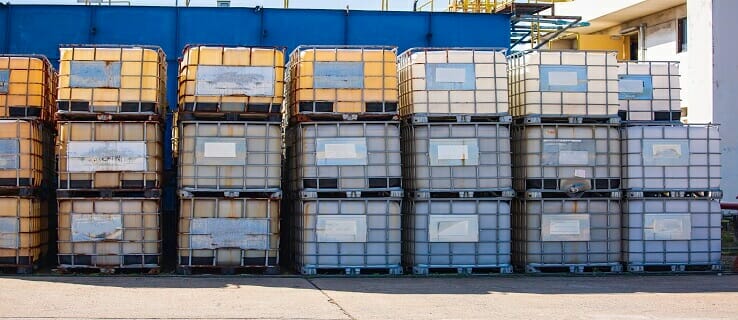Regarding IBC (Intermediate Bulk Container) totes, the material used in their construction plays a crucial role in determining their durability, compatibility with different substances, and overall performance.
This article will explore the various materials used in manufacturing IBC totes and their characteristics. So, let’s dive in and discover what IBC material is all about!
Understanding IBC Material
IBC totes are available in different materials, each with its unique properties and applications. The two most common materials used in the construction of IBC totes are:

- High-Density Polyethylene (HDPE): HDPE is a widely used thermoplastic polymer known for its excellent strength, durability, and chemical resistance. IBC totes made from HDPE are suitable for storing and transporting many substances, including water, chemicals, food products, pharmaceuticals, and agricultural materials. HDPE IBC totes are lightweight yet robust, making them ideal for various industries.
- Steel: Steel IBC totes are constructed from stainless steel or carbon steel. These totes are exceptionally sturdy and offer excellent resistance to impact, corrosion, and extreme temperatures. Steel IBC totes are commonly used in industries that require heavy-duty storage and transport, such as chemicals, petroleum, and hazardous materials. They are known for their durability and ability to withstand harsh environments.
Both HDPE and steel IBC totes have advantages and considerations, depending on the specific needs of your application.
HDPE IBC Totes
HDPE IBC totes offer several benefits that make them popular in a wide range of industries:
- Chemical Resistance: HDPE is highly resistant to various chemicals, making it an ideal choice for storing and transporting corrosive substances. It provides a barrier against chemical interactions, preventing contamination and ensuring product integrity.
- Lightweight and Easy Handling: HDPE IBC totes are lightweight compared to steel alternatives, making them easier to handle, maneuver, and transport. Their lighter weight also helps reduce shipping costs.
- Non-Toxic and Food-Grade Compatibility: HDPE is a non-toxic material approved for food-grade applications. This makes HDPE IBC totes suitable for safely storing and transporting food and beverage products.
- Recyclable and Sustainable: HDPE is a recyclable material that contributes to sustainability efforts. Used HDPE IBC totes can be recycled and repurposed into various plastic products, reducing their environmental impact.
Steel IBC Totes
Steel IBC totes offer unique advantages that make them preferred in specific industries:
- Exceptional Strength and Durability: Steel IBC totes are renowned for their robustness and longevity. They can withstand heavy loads, impacts, and extreme conditions, making them suitable for demanding applications.
- Fire Resistance: Steel is inherently fire-resistant, providing an extra layer of safety for storing flammable materials. Steel IBC totes are commonly used in industries where fire hazards are a concern.
- Security and Tamper Resistance: Steel IBC totes can be equipped with security features, such as locking mechanisms, to prevent unauthorized access or tampering with the contents. This is especially important when handling high-value or sensitive materials.
- Long-Term Storage: Steel IBC totes are well-suited for long-term storage due to their robust construction and resistance to degradation over time. They provide a reliable and secure solution for extended storage requirements.
Used IBC Totes for Sale Near Me
If you’re considering purchasing IBC totes, you might find value in exploring used options. Used IBC totes for sale near you can be cost-effective, especially if you have budget constraints or require temporary storage solutions.
When searching for used IBC totes, it’s important to ensure their condition and suitability for your specific needs. Check for any visible damages, leaks, or signs of wear that may compromise their performance. Additionally, consider the previous contents of the totes to ensure compatibility with your intended use.
To find used IBC totes for sale near me, you can explore local classifieds, attend industrial auctions, or contact suppliers and distributors in your area. Be sure to inquire about the history of the totes and any warranties or guarantees provided by the seller.
Conclusion
IBC totes are available in different materials, including HDPE and steel, each offering unique characteristics and advantages. HDPE IBC totes provide chemical resistance, lightweight handling, food-grade compatibility, and recyclability. On the other hand, steel IBC totes offer exceptional strength, durability, fire resistance, and security features.
Whether you choose HDPE or steel IBC totes, selecting the right material depends on your specific requirements and the nature of the substances you need to store or transport. Consider chemical compatibility, strength requirements, and environmental conditions to make an informed decision.
If you’re looking for IBC totes, including used options, for sale near you, take the time to evaluate the condition and suitability of the totes to ensure optimal performance and value for your business.